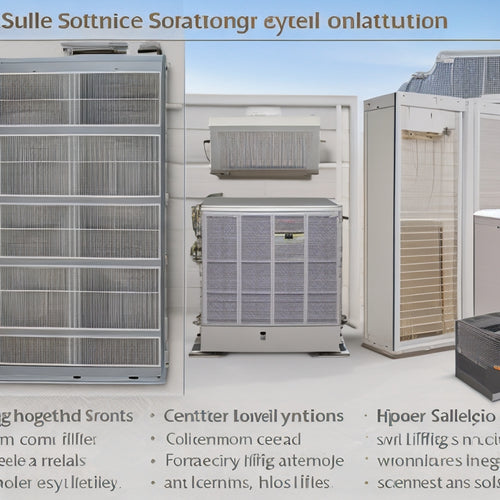
What Fleet Owners Need to Know About Solar
Share
As a fleet owner, you're likely aware that switching to solar power can greatly reduce your operating costs and carbon footprint, but you may not know where to start or what factors to take into account when integrating solar panels into your fleet operations. Solar power offers numerous benefits, including lower operating costs, a smaller carbon footprint, and potential government incentives. To get started, you'll need to evaluate your energy requirements, facility compatibility, and vehicle compatibility. You'll also need to take into account installation timelines, panel warranties, and system monitoring. As you explore solar power for your fleet, there's more to discover about the installation process, maintenance, and cost savings.
Key Takeaways
• Fleet owners can reduce operating costs and carbon footprint by integrating solar power into their fleets.
• Solar panel installation requires evaluating energy requirements, facility compatibility, and potential vehicle compatibility issues.
• Regular maintenance and inspection of solar panels, mounts, and electrical connections are crucial for optimal performance and safety.
• Conducting a detailed cost-benefit analysis can help fleet owners determine the viability and ROI of solar-powered fleets.
• Government incentives, tax credits, and grants can provide significant financial support for fleet owners transitioning to solar power.
Benefits of Solar for Fleets
By integrating solar power into their operations, fleet owners can greatly reduce their reliance on fossil fuels, leading to lower operating costs and a smaller carbon footprint. As you consider shifting to solar, you'll want to explore the various fleet incentives available.
Governments and organizations offer incentives to encourage the adoption of clean energy, such as tax credits, grants, and low-interest loans. By taking advantage of these incentives, you can offset the initial investment costs of solar integration.
Moreover, the environmental impact of solar power can't be overstated. By reducing your reliance on fossil fuels, you'll decrease greenhouse gas emissions and contribute to a cleaner environment. This not only benefits the planet but also enhances your fleet's reputation as an environmentally responsible operator.
As you weigh the benefits of solar, consider the long-term savings and the positive impact on the environment. By making the switch to solar, you'll be taking a significant step towards a more sustainable future.
How Solar Panels Work
As you consider integrating solar power into your fleet operations, understanding how solar panels work is essential to making an informed decision. Solar panels convert sunlight into electrical energy through the photovoltaic effect, a process where sunlight excites electrons in photovoltaic cells. This energy conversion process allows solar panels to generate electricity, making them an attractive option for fleets looking to reduce their carbon footprint.
Here are the key steps involved in how solar panels work:
-
Photovoltaic Cells: Solar panels are composed of many small photovoltaic cells, which are made from semiconducting materials like silicon.
-
Energy Absorption: When sunlight hits a photovoltaic cell, it absorbs the energy, exciting the electrons.
-
Electrical Current: The excited electrons flow through the material, creating an electrical current.
Solar Panel Installation Options
You'll need to take into account the type of installation that best suits your fleet's operations, as roof-mounted, ground-mounted, and building-integrated solar panel installations each have their own advantages and limitations.
When considering a roof-mounted installation, you'll need to make sure your roof meets the necessary requirements, including a structurally sound roof deck, sufficient space, and minimal shading. Roof-mounted installations are ideal for fleets with existing infrastructure, as they can be easily integrated into your existing facility.
On the other hand, ground mounts offer more flexibility regarding panel orientation and can be installed in open spaces. Ground mounts are a good option for fleets with available land and limited roof space.
Additionally, building-integrated installations can be incorporated into your building's architecture, providing a sleek and modern look.
Regardless of the installation type, consulting with a solar expert is crucial to determine the best option for your fleet's specific needs and ensure a safe and efficient installation.
Key Considerations for Fleet Owners
As you explore solar-powered solutions for your fleet, you'll need to take into account several critical factors that can impact the success of your investment.
From ensuring a seamless solar panel installation to addressing potential vehicle compatibility issues, you'll want to carefully evaluate the unique needs of your fleet.
Solar Panel Installation
When planning a solar panel installation, fleet owners must carefully evaluate their energy requirements and assess the compatibility of their facilities to guarantee a successful integration with their existing infrastructure.
To make sure a seamless installation process, consider the following key factors:
-
Installation timelines:
A well-planned installation schedule can minimize downtime and guarantee that your operations continue uninterrupted. Be sure to work with an experienced installer who can provide a realistic timeline for completion. -
Panel warranties:
Look for manufacturers that offer extensive warranties (25 years or more) to secure that your investment is protected in the long run. -
System monitoring and maintenance:
Regular monitoring and maintenance are essential to optimize system performance and extend the lifespan of your solar panels. Ensure that your installer provides adequate support and maintenance services.
Vehicle Compatibility Issues
Fleet owners must guarantee that their vehicles are compatible with solar-powered charging systems to avoid potential electrical and safety issues. You must verify that your vehicles' electrical infrastructure can support the charging protocols of the solar-powered charging system. Incompatible systems can lead to electrical shocks, fires, or damage to your vehicles.
You should check the voltage, current, and power ratings of both your vehicles and the solar-powered charging system to make sure they match. Additionally, you should ensure that the charging protocols, such as Level 1, Level 2, or DC Fast Charging, are compatible between your vehicles and the charging system. Incompatible charging protocols can prevent your vehicles from charging properly or even damage the electrical system.
Energy Storage Options
You'll need to select an energy storage option that integrates seamlessly with your solar-powered charging system, guaranteeing a stable and efficient power supply for your fleet. This is essential for maintaining grid resilience and power reliability, especially during periods of high energy demand or grid instability.
When evaluating energy storage options, consider the following key factors:
-
Depth of Discharge (DOD): Choose a battery with a high DOD to maximize energy storage capacity and reduce the risk of battery degradation.
-
Cycle Life: Select a battery with a high cycle life to ensure a longer lifespan and reduced maintenance costs.
-
Thermal Management: Opt for a battery with built-in thermal management to prevent overheating and ensure safe operation.
Solar Panel Maintenance and Repair
As you integrate solar panels into your fleet operations, you'll need to prioritize maintenance and repair to guarantee maximum energy harvesting.
To do so, you'll want to establish a regular cleaning schedule for your panels, assess damage after severe weather events, and keep a close eye on battery health.
Panel Cleaning Schedules
Regular cleaning schedules are essential to maintaining peak solar panel performance, and a well-planned cleaning routine can help prevent energy losses of up to 25% caused by dirt and debris accumulation. As a fleet owner, you understand the importance of maximizing energy output while minimizing maintenance costs.
Dust accumulation is a significant concern, as it can reduce panel efficiency by up to 15%.
To guarantee top performance, consider the following cleaning schedule:
-
Daily inspections: Quickly inspect your panels for visible debris or damage.
-
Weekly cleaning: Use a soft-bristle brush and distilled water to gently remove loose dirt and debris.
-
Monthly deep cleaning: Use a mild soap solution and a soft cloth to remove stubborn dirt and grime.
Remember to conserve water by using a bucket and a mop to clean your panels, especially in areas where water conservation is a priority.
Damage Assessment Checklists
To guarantee timely and efficient repairs, develop a thorough damage assessment checklist that assists you in identifying and documenting issues with your solar panels, such as cracks, corrosion, and electrical faults. This checklist will help you pinpoint potential risk factors that can compromise the performance and safety of your solar fleet.
When creating your checklist, consider incorporating inspection protocols that evaluate the condition of your panels, mounts, and electrical connections. Look for signs of wear and tear, such as loose connections, damaged cables, or physical damage to the panels themselves.
Don't forget to inspect the surrounding environment, including the roof or ground surface, for any potential hazards that could impact your solar array's performance.
Battery Health Monitoring
You must monitor your solar fleet's battery health regularly to prevent unexpected downtime and guarantee maximum energy harvesting. As a fleet owner, it's essential to keep a close eye on your batteries' performance to maintain peak energy production. Neglecting battery health monitoring can lead to reduced energy output, shortened battery lifespan, and even safety risks.
To maintain your solar fleet's battery health, follow these essential steps:
-
Track charging cycles: Monitor the number of charging cycles your batteries have undergone to anticipate potential degradation.
-
Analyze data analytics: Utilize data analytics to identify trends and anomalies in your batteries' performance, enabling proactive maintenance and repair.
-
Schedule regular inspections: Perform routine inspections to detect any signs of wear and tear, ensuring prompt intervention before minor issues escalate into major problems.
Cost Savings and ROI Analysis
By embracing solar-powered fleets, owners can access significant cost savings and boost their bottom line, with a potential ROI analysis revealing a payback period of just a few years. When considering investing in solar, it's crucial to understand the financial projections and investment strategies involved.
A detailed cost-benefit analysis will help you determine the viability of solar-powered fleets for your business. You'll want to calculate the upfront costs of installation, maintenance, and potential upgrades, as well as the ongoing savings from reduced fuel consumption. Additionally, you should factor in any government incentives, tax credits, or grants that may be available to support your shift to solar.
By crunching the numbers, you can develop a detailed financial model that outlines the expected ROI and payback period for your investment. This will enable you to make informed decisions about whether solar-powered fleets are a sound financial strategy for your business.
With careful planning and analysis, you can maximize the full potential of solar energy and reap the rewards of a more sustainable, cost-effective fleet operation.
Future of Solar in Fleet Industry
As the fleet industry continues to evolve, solar power is poised to play an increasingly prominent role in shaping its future, with advancements in technology and infrastructure paving the way for widespread adoption.
You can expect to see significant growth in the adoption of solar power in the fleet industry, driven by government incentives and shifting industry trends.
Here are three key trends to watch:
-
Increased adoption of solar-powered EV charging infrastructure: As electric vehicles become more prevalent, solar-powered charging stations will become a vital component of the fleet industry's infrastructure.
-
Integration of solar power with energy storage systems: You'll see a greater emphasis on combining solar power with energy storage systems to provide a reliable and efficient source of power for fleets.
-
Government incentives driving adoption: Governments will continue to offer incentives to encourage the adoption of solar power in the fleet industry, making it more economically viable for you to make the switch.
As you look to the future of solar in the fleet industry, staying informed about the latest developments and trends is crucial. By doing so, you'll be well-positioned to take advantage of the benefits that solar power has to offer.
Frequently Asked Questions
Can Solar Panels Be Installed on Leased or Rented Properties?
When considering solar panels on leased or rented properties, you'll need to review landlord agreements and property contracts to verify you have permission to install and confirm the contract allows for modifications.
How Do I Ensure Solar Panels Comply With Local Building Codes?
To guarantee solar panels comply with local building codes, you'll need to research permit requirements, familiarize yourself with zoning regulations, and understand code enforcement and inspection procedures to avoid penalties and ensure a safe installation.
Are Solar Panels Compatible With Existing Fleet Management Systems?
You'll find that solar panels can seamlessly integrate with your existing fleet management systems, providing real-time data analytics to optimize energy consumption and reduce operational costs, ensuring a smooth system integration.
Can I Install Solar Panels on Irregularly Shaped Roofs or Trailers?
When you're dealing with irregularly shaped roofs or trailers, you'll face unique Roof Obstacles and Trailer Dynamics. Fortunately, solar panel manufacturers are adapting to these challenges, offering tailored solutions to guarantee safe and efficient energy harvesting.
Do Solar Panels Void the Warranty on My Fleet Vehicles?
You won't necessarily void your fleet vehicles' warranty by installing solar panels, but you'll need to make sure the installation doesn't compromise battery life or trigger warranty claims; consult with manufacturers and installers to guarantee compliance.
Related Posts
-

Why Solar HVAC Filters Revolutionize Home Energy Efficiency
By adopting solar HVAC filters, you're shifting your home's energy reliance from fossil fuels to clean, renewable sou...
-

3 Sun-Powered Automated Shades for Energy-Savvy Homes
You're looking to change your home into an energy-savvy haven, and sun-powered automated shades are an essential step...
-

What Water-Saving Gardens Complement Electric Vehicle Ownership?
As you pair your electric vehicle with a water-saving garden, you're not only reducing your carbon footprint but also...


